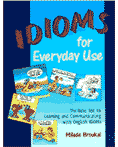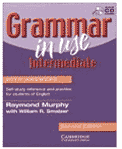| Home | Resources | FAQ | About | Contact | ||||||||||||||||||||||||
|---|---|---|---|---|---|---|---|---|---|---|---|---|---|---|---|---|---|---|---|---|---|---|---|---|
 |
||||||||||||||||||||||||
|
Some students are content with knowing just enough to get by. Those who've reached level 3 are either lucky enough to be blessed with the knack for languages and moves ahead with little or no effort. Or...has a strong desire to learn English either for business or for an advanced degree at a university. What I do in level 3 is of course a lot harder than level 2. You can use the
...
as well as the...
The best way to find good deals on the above books is to google them using the search tool below.
I use:
But I always try to use one pagers and I utilize the same teaching method as for the children's stories in Level 2. Another thing I do in this class is on Mondays I will ask what they did over the weekend. (Actually I do this in every level.) Then sometimes I will have them write a composition about what they did over the weekend. Then they read it out loud while I make corrections as they go along.
You can have in your arsenal several topics of conversation and composition such as: What do I love about my life? What's fabulous about my life? What inspires me? What the best thing that happened to you in your life, your day, your week, your weekend? What's exciting about my life? What's the most embarrassing thing that ever happened to me? What's the most amazing thing? Who do I love in my life and why? What do I like about America (or whatever country you are teaching in)? What don't I like about America? What's the most bizarre thing that ever happened to me? What's the scariest thing that ever happened to me? If I won the lottery what would I do with all the money? Top 10 things I like about...(my life, my job, my family, my spouse or mate, my country, America, money) Top 10 reasons that I...(study English, came to America, got married, like money, want money, my job, like my country) If I could choose one person in history to be on a desert island with who would it be and why. If I could choose one person in pop culture to be on a desert island with who would that be and why. Note: It's OK to repeat any of these in the same course. And although the students might say "we already did that" it's good to review and have them do the same exercise over again. As they say, "Repetition is the mother of skill." Also, you can use
these quotes I've collected. Deciphering quotes and having a discussion
about them is a good way for your students to start getting a handle on the
nuances of English. And to make lesson planning really easy I recommend checking out these up-to-date esl lesson plans
based on ReutersŪ news articles. ESL Lesson Plans for Intermediate Students -- Level Two ESL
Lesson Plans for Advanced Students -- Level Four
Be sure to signup now for our newsletter ESL Teacher Tips Ezine. Each month you'll get great tips, articles and advice that can help your ESL teaching be more effective and more fun.
|
|||||||||||||||||||||||
 Idiomatic American English: A Step-By-Step Workbook for
Learning Everyday American Expressions by Barbara K.
Gaines
Idiomatic American English: A Step-By-Step Workbook for
Learning Everyday American Expressions by Barbara K.
Gaines


